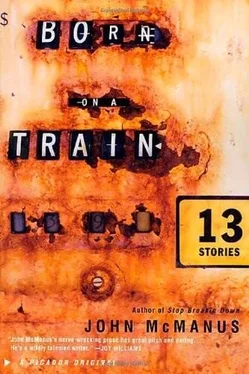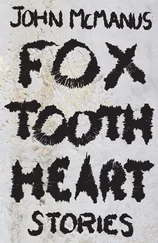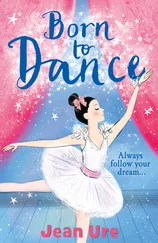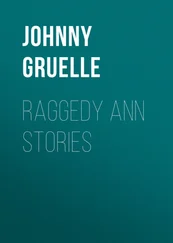With what?
Guns, said Sina.
Gass opened the glove box and pulled a revolver out and said, Like this?
They both laughed out loud.
No, Sina said, assault rifles.
Those are illegal here, said Gass.
So is this, Logan said, hitting the gun with his finger.
I was the only one who lived of all my brothers, Sina said, the first I’d heard him speak of it. I was the youngest. It was the perfect year to be born in.
I touched the azure nucleus of his bracelet. What an experience to have offered up those corpses in the desert, his ash-streaked face aglow with oil. He had obtained a visa to Kuwait where he’d fled to Greece and then to Vietnam on a false Italian passport. The jails were very comfortable, he told our drivers, moving his hands more and more as he talked. There was a library and a television. Logan nodded and blew smoke out the window as we passed a native village, a hilltop pa, a field of unshorn sheep where rimu trees were mangled by the wind. The truck was spinning wildly. Sina perched on the edge of his seat and smiled.
Where you headed to? asked Logan.
Coromandel.
What for? he said.
To get married, I said.
The truck bounced with Logan’s hearty laugh. The sky was barbed with cotton daggers. We cut across the matai shadows westward.
Let’s see you kiss the bride, he slurred.
Gass twice clapped his hands and hollered, Woooo.
That’s a real pretty girl you got there, said Logan.
I nodded.
So kiss her, he said.
Sina had his eyes shut; he was smiling. In the wind his black hair shimmered like a horse’s mane. I slid my arm around his shoulder. Clouds turned the hills into volcanoes. The whole world rang.
You’re awful young to get hitched, said Logan.
Sina released me so that I could say, It’s the only way they’ll let him into America.
Sina blinked his eyes. My brain twitched. Logan said, What?
Gass threw his beer can out the window and nailed a crooked road sign rising from the left ditch.
Iranians, I said. Only way they’ll let ’em into the country.
You said him.
I said them.
Why would you say them? he said.
It’s just the way I said it.
There’s no them. There’s just you and her.
There’s different ways to talk, I said.
He narrowed his eyes into the mirror. Logan looked straight at Sina’s Adam’s apple working like a piston when he swallowed. He saw Sina’s shoulders, their angles sharp and cuspidal, his necklace linked by tiny sailor’s cutlasses, forged to match his neck: I felt those blades like they touched the skin of mine. There was no them. The dress didn’t quite fit and Sina’s feet were so long and skinny and Logan’s head turned red, and I shut my eyes and listened for the car to stop.
Then Logan snorted. That’s how all you Yanks talk, he said. Like your asshole’s hummin the kazoo.
I said them. Really.
Get off it already. Pass me another beer from back in the bed.
When I turned to do it, a blue fire filled the landscape behind me and burned everything at once: my red cheeks with ice, my hand by way of the cold beer I now held.
She’s only using you to get in, said Gass, so she can blow shit up.
Blow shit up, Logan repeated and laughed.
Gass shouted in an Arabic accent. I will explode you! Die Christian scum!
It was the funniest thing Logan had ever heard.
Answer me, kid, said Gass — have you thought about it?
I don’t care what she blows up, I said.
Let me kiss her and I’ll drive you all the way to Tauranga, Logan said as we skirted an island-studded bay.
That was a long way. Logan turned around and smelled like motor oil, and Gass couldn’t steer at all. We had many miles to cover. I thought about the sky, how if it did this every day, I’d never sleep. Sina clawed his hands telling how he’d torn hearts out of corpses once, at a sixteen-year-old’s command, how they’d reeked like raw butcher’s beef. He spoke a Farsi sentence. Gass guffawed to Logan and they slurred in Kiwi brogue and Sina answered them. Every word was foreign. Clouds bolted across the sky. Suddenly Sina was holding a ponga frond, and he fanned me with it. That was the best moment of my life, I think. My ears couldn’t catch a single word. I didn’t even speak a language, except for the names of trees.
Picking blackberries was the only way Clay could make money. Three cents a quart. His aunts bought them to use in cobblers; his mother had always made the best cobbler. What was up in the trees going rudy-rudy-rudy? he asked, and his sister Laura laughed, because it was jarflies. The ice cream melted quickly; Clay could taste the sawdust grains. Listen, listen, the cats are pissin. He played horseshoes with his uncles until late at night. The summer passed like fading iron-weed. There wasn’t anything to buy with his twenty-four cents. Laura wanted a nickel, but he kept it all; he’d picked the berries himself. She’d never even climbed a mountain. The moonshine jug was heavier than he’d imagined. He poured it onto his chest so that it dribbled down to his belly. By August all the corn had died. His uncles roasted the pig overnight in cinders and shot skeet while Clay’s cousins played tag in the orchard. Fall was snake time; the sky was dark when he walked to school and dark when he got home. Kids built forts of snow, threw ice in one another’s ears.
Hey kid, said Laura, I’m gonna kill that cat.
Stay the hell away from my cat, said Clay.
Say hell again I’ll tell Aunt Lottie.
The snowflakes felt so cold against his face, and Piggott and the others watched Laura’s pupils glinting. Kitty, kitty, right between the eyes.
She pointed to her own chin.
Free shot, she said.
Clay didn’t know if it was a trick. Snow tickled when it melted on his tongue. He didn’t take the shot, and Laura didn’t hit him. She was learning how to crochet. When she slipped on algae on the gristmill’s waterwheel, it made sense, because Clay couldn’t picture her grown up. He knew what he’d look like; every night in his nightmares he became an ancient man, but Laura wasn’t with him. The cat hissed when he tied its paws to the highboy with twine. After the blizzard it came home with frozen eyes. He sat by the oven talking to it, giving it milk; he didn’t care. I’ll saw your arms off, he told Laura at the viewing. It was harder to breathe on top of mountains. God bless all my aunts and uncles, everyone, please forgive me all my sins forever.
The redbud trees bloomed three days before the dogwoods, and Clay built a dam with rocks and watched blossoms filling the holes between the stones. The government men surveying the cove poisoned themselves on indianberries that had burst up among the dandelions.
That was a year.
Isaac’s father bought him a German shepherd for his seventh birthday, and Isaac named it Rocks. He called his father Jearold, not Daddy, because that was his name. They lived together in a trailer on Jericho Road at the foot of Chilhowee Mountain. Isaac had never had a dog before, except the one that had died before he was born. His mother hated dogs, but she was dead now too, so one day in October Jearold came home from jail with a puppy, and it grew fast; by December they had to tie it to the gum tree to make it mean. Jearold stood at the back door and shot at it with the BB gun.
Stop it, Isaac said.
He ain’t mean enough to hunt yet, said Jearold. Look at the little faggot.
The dog looked up at him with scared but angry eyes and panted.
He’s my dog, said Isaac.
That’s where he gets the fag part from.
But Jearold was only joking when he said things like that. Isaac knew his father loved him because they spent so much time together. Jearold had taught Isaac how to play horseshoes. They played it every evening when Jearold got home from his job at the airport in town. They laughed and chased each other through the mud. Afterwards Jearold took Isaac with him to his friends’ houses where the men drank whiskey in lawn chairs until two or even three o’clock in the morning. No one else at Isaac’s school got to stay awake that late.
Читать дальше












